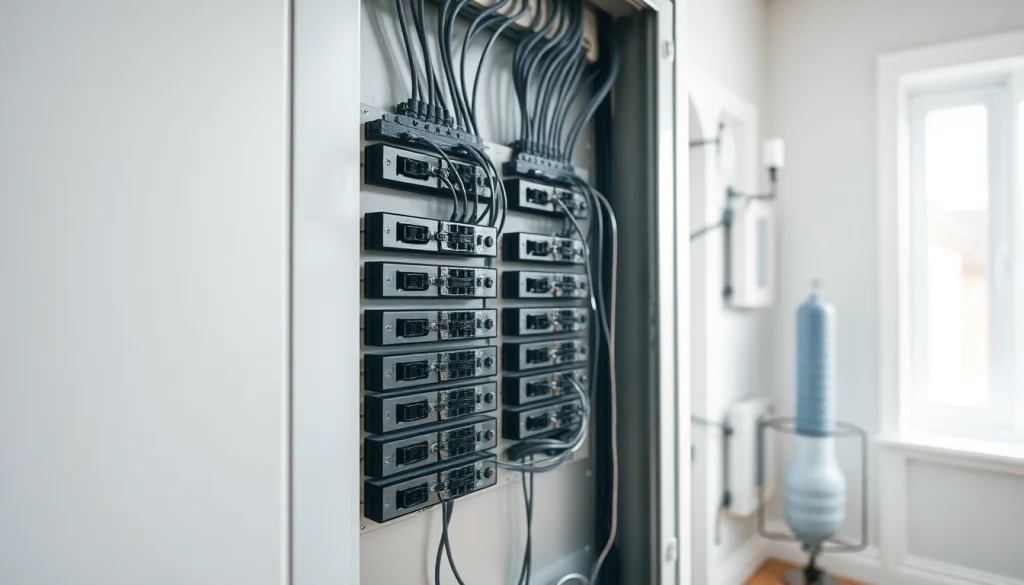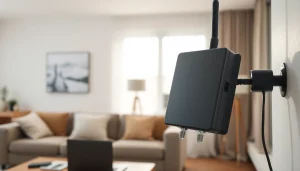
Understanding the Basics of Electrical Panels
What Is an Electrical Panel?
An electrical panel, often referred to as a breaker box or service panel, serves as the central hub for distributing electricity throughout your home. By connecting to the main service line, it divides electrical power into various circuits that supply your household devices and appliances. Understanding what an electrical panel is and how it functions is crucial for homeowners, especially when considering upgrades or repairs. For detailed insights on when to upgrade your electrical panel, refer to this Electrical Panel guide.
Components of a Typical Electrical Panel
A standard electrical panel consists of several critical components that work together to manage your home’s electrical system. Key components include:
- Main Breaker: This is the switch that controls the entire power supply to your home. It can shut off electricity in emergencies.
- Circuit Breakers: These devices protect individual circuits from overload by tripping and cutting off power when too much current flows through.
- Bus Bars: These conductive strips distribute power from the main breaker to the individual circuit breakers.
- Grounding System: Essential for safety, grounding helps prevent electrical shocks by providing a path for excess electricity to safely dissipate into the ground.
- Neutral Bus Bar: This component connects wire accesses to the grounding system, channeling excess current safely.
Functionality of Electrical Panels in Modern Homes
Electrical panels fulfill several vital functions in modern homes:
- Electrical Distribution: They distribute electricity from the service line to various circuits as needed by appliances and devices.
- Overload Protection: They monitor the load across circuits, preventing overloads that could lead to fires or equipment damage.
- Circuit Management: Panels allow homeowners to control which circuits receive power, enabling easy management for maintenance and upgrades.
In essence, electrical panels are fundamental to ensuring your home enjoys a stable, safe electrical supply.
Signs Your Electrical Panel Needs an Upgrade
Overcapacity: Identifying Overloaded Circuits
One of the primary indicators that an electrical panel may need an upgrade is circuit overload. An overloaded circuit can lead to consequences, including:
- Frequent breaker trips: If you notice that circuit breakers trip regularly, it’s a sign that they cannot handle the electrical demands placed on them.
- Hot outlets or walls: Overloaded circuits can cause heat buildup, making outlets or surrounding walls hot to the touch, which is a severe fire hazard.
- Dim or flickering lights: If lights dim or flicker when you turn on a device, this indicates insufficient power is being supplied.
Reviewing the total load on your panel and the capacity of each circuit is essential in identifying an overloaded situation.
Frequent Breaker Trips: Symptoms and Consequences
When breakers trip frequently, it’s not merely an inconvenience; it’s a clear sign that the electrical panel is struggling to support the load. Continuous tripping can lead to:
- Frustration: Regular interruptions can disrupt your daily life.
- Increased risk of electrical systems failure: Frequent breaker trips can weaken the panel and lead to more significant issues.
- Potential fire hazards: Overloaded circuits can create overheating, leading to electrical fires.
Identifying the cause of circuit trips is critical—this might involve assessing the overall load or the specific circuits and their demands.
Age of Your Electrical Panel: When Is It Time for Replacement?
The age of an electrical panel plays a significant role in its effectiveness and safety. Most panels have a lifespan of 20 to 30 years. If your electrical panel is approaching or has exceeded this age, consider these aspects:
- Older technology: Older panels may not meet current code requirements or safety features found in newer models.
- Increased demands: Homes have become increasingly reliant on technology, requiring more from electrical panels than they were originally designed to handle.
- Outdated materials: Older panels may have components made with materials that do not meet today’s safety standards.
When your panel ages, it is wise to consult a professional to assess its condition and discuss potential upgrades.
Benefits of Upgrading Your Electrical Panel
Improved Safety Measures with New Technology
Upgrading your electrical panel improves not only functionality but significantly enhances safety through modern features:
- Advanced technology: Newer panels come equipped with more effective protection mechanisms, such as GFCI and AFCI breakers that reduce risks of electrical shocks and fire hazards.
- Improved insulation materials: Modern panels utilize materials designed to withstand greater electrical loads without overheating or breaking down.
- Smart technology integrations: Many newer panels can integrate with home automation systems, allowing for real-time monitoring and control of electrical usage.
By upgrading, homeowners improve the safety of their electrical systems and enjoy peace of mind knowing that their homes are equipped with modern safety features.
Increased Electrical Capacity and Efficiency
Upgrading an electrical panel also allows for a significant increase in the capacity and efficiency of the electrical system. The benefits include:
- Higher amperage options: New panels can handle larger amperage, accommodating modern appliances and technology that demand more power.
- Better load balancing: An upgraded panel can provide more evenly distributed power, reducing the likelihood of overloads.
- Energy efficiency: Modern materials and technologies can minimize energy loss, leading to potential cost savings on energy bills.
This increased capacity enables homeowners to add additional devices or appliances without fear of system failure.
Compliance with Modern Electrical Standards
As technology evolves, so do electrical codes and standards. Upgrading your panel is an excellent way to ensure compliance with current regulations. Advantages include:
- Adherence to local codes: Ensuring that your electrical system meets local codes is essential for safety and legality.
- Insurance compliance: Many insurers require that electrical systems meet current standards to maintain coverage.
- Future-proofing your home: Installing a modern panel prepares your home for advancements in technology that may require additional capacity.
An upgraded panel not only ensures compliance but also protects the investment in your home.
Choosing the Right Electrical Panel for Your Home
Types of Electrical Panels: A Breakdown
When selecting an electrical panel, understanding the different types is crucial:
- Main Breaker Panel: This is the most common type used for distributing power to the circuits in residential settings. It contains the main breaker and multiple individual breakers.
- Subpanels: These serve as supplementary panels for homes with larger electrical demands, feeding specific areas or circuits without overloading the main panel.
- Smart Panels: Integrating technology, these panels provide monitoring capabilities that allow homeowners to track energy usage and receive alerts for potential issues.
- Transfer Switch Panels: Used in homes with backup generators, these allow for safe and seamless power transition during outages.
Selecting the appropriate type of electrical panel is vital for ensuring the safety and functionality of your home’s electrical system.
Factors to Consider When Selecting an Electrical Panel
Choosing the right electrical panel involves considering several critical factors:
- Home size and layout: The size and layout of your home will dictate the capacity and number of circuits needed.
- Appliance demands: Analysis of current and future electrical needs can help determine the panel capacity required, e.g., heavy-duty appliances may necessitate a panel with higher amperage.
- Budget: Understanding the costs associated with purchase, installation, and potential upgrades can help in decision-making.
- Manufacturer reputation: Choose reliable manufacturers known for safety and quality, ensuring a panel you can trust.
Taking the time to assess these factors will ensure you choose a panel that meets your needs and ensures safety.
Cost Considerations for Upgrading an Electrical Panel
Upgrading an electrical panel involves not just the purchase of the panel itself but also several cost considerations:
- Panel cost: Depending on amperage and features, costs can range significantly, typically between $250 to $450.
- Installation costs: Professional installation is essential for safety and compliance. Labor costs can add an additional $500 to $1,500, depending on complexity.
- Permits and compliance fees: Local building codes may require permits, which can incur extra costs.
- Potential upgrades to wiring: If existing wiring is older, it may require upgrading to accommodate the new panel’s capacity.
Understanding the total cost will help you plan accordingly and ensure that you make a well-informed investment in your home’s electrical system.
Frequently Asked Questions About Electrical Panels
How Often Should an Electrical Panel Be Inspected?
It is advisable to have your electrical panel inspected every 3 to 5 years by a licensed electrician. Regular inspections can identify potential issues before they escalate, ensuring safety and compliance with electrical codes. Homeowners should also schedule inspections following any major renovations or when installing new high-power appliances.
What Are the Common Myths About Electrical Panels?
Several myths surround electrical panels that can lead to misunderstandings about their functionality:
- Myth 1: If a circuit breaker trips, you can simply reset it without assessing the issue. This practice can lead to serious dangers.
- Myth 2: Once installed, an electrical panel never requires maintenance or upgrades. This is false; panels should be evaluated regularly, especially in older homes.
- Myth 3: All electrical panels are the same. Each panel type may have various capacities and features, catering to different powering needs.
Dispelling these myths can improve understanding and care for electrical systems.
Tips for Maintaining Your Electrical Panel
Proactive maintenance of your electrical panel can extend its life and ensure optimal performance. Consider these tips:
- Keep it clean: Dust and debris can accumulate in the panel, disrupting airflow and insulation. Regularly dust the exterior and schedule professional cleanings as needed.
- Monitor for signs of wear: Pay attention to any weird smells, signs of rust, or discoloration on the panel, and report them to an electrician.
- Ensure proper labeling: Clearly label each circuit breaker for quick identification and to help in troubleshooting power outages.
- Don’t overload circuits: Be cautious about the number of devices plugged into a single circuit to prevent overload.
Implementing these tips can lead to a safer electrical environment in your home, prolonging the lifespan of your panel.





